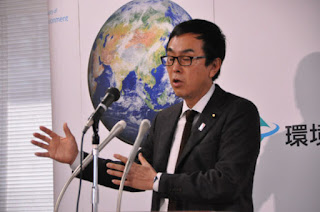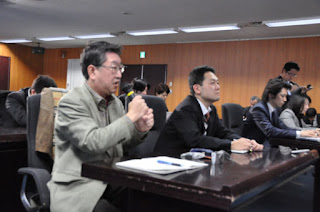Normal
0
10 pt
0
2
false
false
false
EN-US
JA
X-NONE
$([{£¥‘“〈《「『【〔$([{「£¥
!%),.:;?]}¢°’”‰′″℃、。々〉》」』】〕゛゜ゝゞ・ヽヾ!%),.:;?]}。」、・゙゚¢
It is Mr. Yoshiki Kamide that is the
reporter in the news. I’d like to
remember his name. Just the sight of his
picture makes me find that he is a fine person.
Masatoshi
Takeshita
January
17, 2013
English translation of a Japanese article: Ryusaku Tanaka Journal – January 15, 2013 –
Environment
Minister Ishihara Avoids Appointing Reporter Who Grills Him at Press Conference
Environment Minister Isihara who has difficulty in
answering a question of a freelancer
In the Environment Ministry on 15th morning. Photo by Tanaka
Government agencies ignore
distasteful questions in collusion with politicians. The press club that usually brandishes the
public’s right to know won’t make an issue of it.
At the time of the LDP government (until 2009 when the JDP
took power) press conferences held with ministers were controlled by the administration
due to the cozy relations between the administration and the media. After the LDP took back the power, a press conference
in the Environment Ministry seems to be returning to the original state: it was
open to the public.
It is reflected by the
response of the Environment Ministry and Environment Minister Nobuteru Ishihara
over the “slipshod clean-up work” reported by the Asahi Shimbun in its morning
paper on 4th.
A reporter of the Asahi
Shimbun with an aim to write a sequel repeatedly raised his hand at a press
conference on 11th. However,
he was never appointed. It would be the
case with a freelancer, but the reporter is a member of the press club. It is apparently abnormal that he was not chosen
as a questioner.
The Environment Ministry budgeted one trillion 108.8 billion
yen as the clean-up expenses for 2012 alone.
If “sloppy work” is found in a project which a lot of money has been
invested in, the Environment Ministry is to be blamed for it. The Environment Minister, chief executive, is
naturally placed in a more difficult situation.
For the public relations office,
a facilitator of a press conference (in charge of appointing reporters), and the
ministry, it is “crisis management” not to make reporters inquire about the
slipshod clean-up issue.
The public relations office has an instinctive character
that “they should protect the minister.”
“You stand in the between
the minister office and the reporter (of Asahi). You’re in a tough situation, aren’t you?”
this writer asked the public relations office chief such a leading question. “Can’t you understand?” he said while
scratching his head.
Strangely, other press club members never care that a
colleague has been ignored. It cannot be
helped if a reporter is not appointed next time when the reporter wants to grill
the minister. What misfortune befalls on others today might happen to them
tomorrow. It is not too much to say that
the cozy relations among government agencies, politicians and the press club
have prevented the public from knowing truth.
Mr. Yoshiki Kamide, a
freelancer, opened a crack in this at today’s press conference. “Although a reporter of Asahi desperately
raised his hand at the previous press conference, he was not appointed. Minister Ishihara seemed to avoid doing
so. The minister should achieve
accountability for the public.” Reporter Kamide grilled him.
Minister Ishihara unconvincingly explained himself, saying “I
have to answer questions of many reporters within limited time frame. I have a sense of crisis toward CO2 issue.” He just repeated empty phrases in pain
because he was stuck for an answer.
He himself says “I have to answer questions of many
reporters.” Then, why did he exclude the
reporter of Asahi alone?
“The minister should
achieve accountability.” Yoshiki Kamide,
a freelancer, (person on the left with a microphone) grills Mr. Ishihara. = Photo by Tanaka =
A reporter of NHK, the
coordinator of the press club, asked a question, using the word “improper
clean-up” not “slipshod clean-up.”
He said “As for the slipshod clean-up work issue, have you found another
improper clean-up work after questioning subcontractors?”
Minister Ishihara answered: “Clean-up work is the foundation
of reconstruction. ………… We will work out
a policy after carefully examining whether there has been improper clean-up
work or not.” It appears that the press club coordinator asked the minister
a question which he was able to answer confidently.

